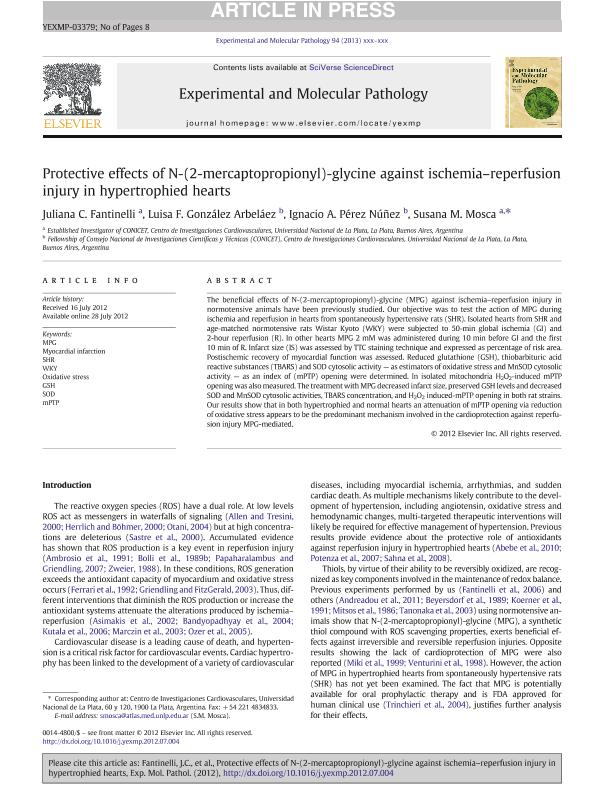Artículo
Protective effects of N-(2-mercaptopropionyl)-glycine against ischemia–reperfusion injury in hypertrophied hearts
Fantinelli, Juliana Catalina ; González Arbeláez, Luisa Fernanda
; González Arbeláez, Luisa Fernanda ; Pérez Nuñez, Ignacio Adrián
; Pérez Nuñez, Ignacio Adrián ; Mosca, Susana Maria
; Mosca, Susana Maria
 ; González Arbeláez, Luisa Fernanda
; González Arbeláez, Luisa Fernanda ; Pérez Nuñez, Ignacio Adrián
; Pérez Nuñez, Ignacio Adrián ; Mosca, Susana Maria
; Mosca, Susana Maria
Fecha de publicación:
02/2013
Editorial:
Academic Press Inc Elsevier Science
Revista:
Experimental And Molecular Pathology
ISSN:
0014-4800
Idioma:
Inglés
Tipo de recurso:
Artículo publicado
Clasificación temática:
Resumen
The beneficial effects of N-(2-mercaptopropionyl)-glycine (MPG) against ischemia–reperfusion injury in normotensive animals have been previously studied. Our objective was to test the action of MPG during ischemia and reperfusion in hearts from spontaneously hypertensive rats (SHR). Isolated hearts from SHR and age-matched normotensive rats Wistar Kyoto (WKY) were subjected to 50-min global ischemia (GI) and 2-hour reperfusion (R). In other hearts MPG 2 mM was administered during 10 min before GI and the first 10 min of R. Infarct size (IS) was assessed by TTC staining technique and expressed as percentage of risk area. Postischemic recovery of myocardial function was assessed. Reduced glutathione (GSH), thiobarbituric acid reactive substances (TBARS) and SOD cytosolic activity — as estimators of oxidative stress and MnSOD cytosolic activity — as an index of (mPTP) opening were determined. In isolated mitochondria H2O2-induced mPTP opening was also measured. The treatment with MPG decreased infarct size, preserved GSH levels and decreased SOD and MnSOD cytosolic activities, TBARS concentration, and H2O2 induced-mPTP opening in both rat strains. Our results show that in both hypertrophied and normal hearts an attenuation of mPTP opening via reduction of oxidative stress appears to be the predominant mechanism involved in the cardioprotection against reperfusion injury MPG-mediated.
Palabras clave:
Mpg
,
Myocardial Infarction
,
Shr
,
Wky
,
Oxidative Stress
,
Gsh
,
Sod
,
Mptp
Archivos asociados
Licencia
Identificadores
Colecciones
Articulos(CIC)
Articulos de CENTRO DE INVEST.CARDIOVASCULARES (I)
Articulos de CENTRO DE INVEST.CARDIOVASCULARES (I)
Citación
Fantinelli, Juliana Catalina; González Arbeláez, Luisa Fernanda; Pérez Nuñez, Ignacio Adrián; Mosca, Susana Maria; Protective effects of N-(2-mercaptopropionyl)-glycine against ischemia–reperfusion injury in hypertrophied hearts; Academic Press Inc Elsevier Science; Experimental And Molecular Pathology; 94; 1; 2-2013; 277–284
Compartir
Altmétricas



